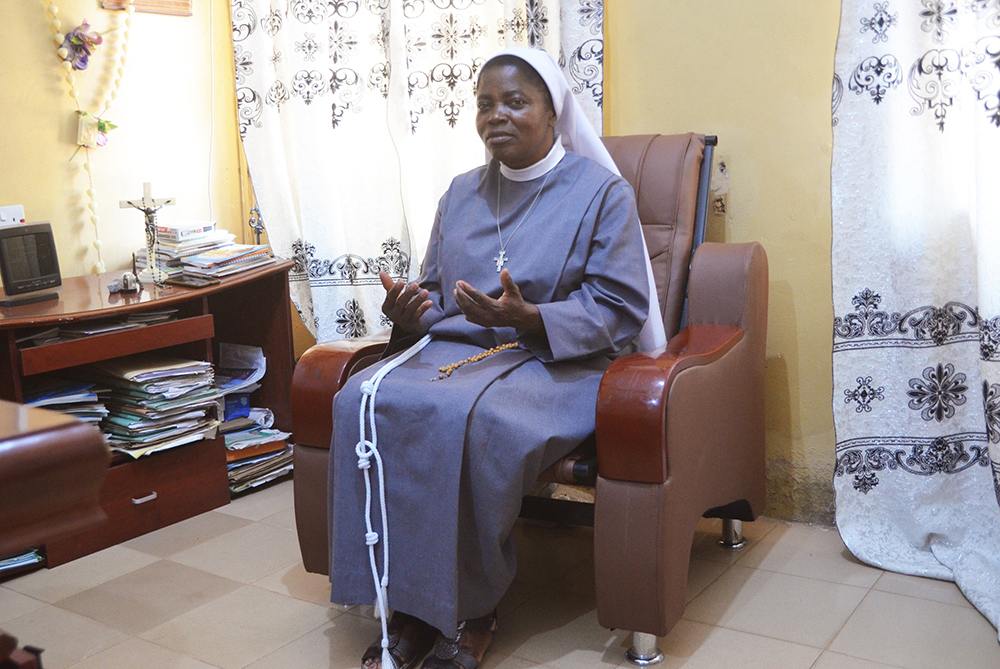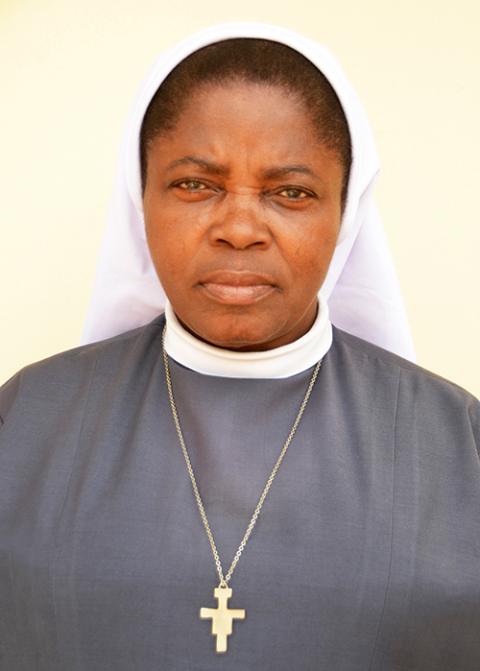
Sr. Cordelia Anikwem, pictured Jan. 22, 2024, is a member of the Tertiary Sisters of St. Francis who works in Wukari in Taraba, Nigeria, and is development officer for the refugee program. Her religious congregation is providing humanitarian aid to Cameroon refugees amid Nigeria's own lingering insecurity and Christian persecution. (OSV News/Valentine Benjamin)
When Sr. Cordelia Anikwem was 15, home-to-home visitation was routine.
"I was a member of the Legion of Mary and Blue Army," Anikwem said. "We used to do a home-to-home visitation, visiting the elderly at home and the sick in hospitals."
But no one, including her parents, suspected that she had signed up for a lifetime of humanitarian service — long before she became a sister.
Building on her childhood service, Anikwem joined the Congregation of Tertiary Sisters of St. Francis in 2006 where she received Formation of Postulancy and afterward proceeded to the novitiate in 2007. At the end of the two years in the novitiate, she made a temporary profession before becoming a permanent member in 2017 — all in Cameroon, where she served for 15 years before coming to Nigeria.
At the same time, a crisis in Cameroon between the minority Anglophone and the French-speaking Cameroonians — which started in 2017 — forced thousands of Cameroonians into Nigeria. Many of them were welcomed by Anikwem and her congregation. Coupled with an internal crisis in the host community (Takum, located in Taraba, the northeastern region of Nigeria) it has not been without difficulties. As many Indigenous people lost their homes due to arson, the available resources became overstretched.
"At a time like this, someone has to be there,'' said Anikwem, who is the development officer for the Tertiary Sisters, an international congregation originally founded by Venerable Maria Hueber to educate girls, but now is an all-encompassing humanitarian service, providing services to underprivileged, the disadvantaged, orphans and pregnant women. As a result of the crisis in Cameroon, the plight of the refugees has become a major focus for the congregation.
''We don't want to make them feel that they are not with their family," Anikwem said.

Sr. Cordelia Anikwem, a nun of the Tertiary Sisters of St. Francis. (GSR photo/Ayo Omotola)
Global Sisters Report: How are you providing humanitarian services to refugees from Cameroon?
Anikwem: When the crisis started in Cameroon, between the Northwest region and the Southwest region, a lot of Cameroonians had to flee into bushes before finding themselves in Nigeria through the border. We have a place called WELCOME HOME in Takum that accommodates new refugees. This is where we first provide a change of clothing, food, toiletries and health care. We also have an empowerment program because they need to stand on their own. As I speak to you, we have some among the refugees who now have shoe shops and tailoring workshops, while some were given cash to start a new life.
So far, how many refugees have benefitted from your aid?
We have about 20,000 refugees we are working with across the state. They are scattered in various villages and local governments.
Now that Nigeria is grappling with inflation, and plummeting currency, which has triggered economic hardship for the citizens, how do you provide shelter, food and clothes for this number of people?
It has not been easy. The surging inflation has truly triggered an economic crisis in the country and it's making life difficult for the citizens. The price of goods and services has tripled but we are coping. We recently embarked on agricultural and animal farming, to create an alternative income source that'd enable us to assist the refugees. Some of the refugees are also sponsored to set up poultry and swine farms to help them meet living costs after completing their skill acquisition program. We however depend on funding from both local and international benefactors.
What is the most touching story of refugees that you have handled and how were you able to provide support?
Stories of people who lost their loved ones are the most touching, especially when you consider the inhuman manner they died. Although we have empathy with people who lost what they worked for all their lives, properties can be reacquired, unfortunately, lives lost can't.
Advertisement
How are you encouraging the survivors of this incident to keep hope alive?
We pray with them, and we organize counseling sessions for them, without failing to encourage them that the sun will shine again. We also have sisters who are seeing to the mental health of those who are traumatized.
What about people who need medical care?
Although, at the moment, we don't have a hospital of our own, we have a clinic where people go for treatment, and we clear the bill. Santa Maria clinic was given to us to manage, but it is not free because it doesn't belong to us.
What are the challenges you face while discharging this noble responsibility?
We have challenges of security, which is common around here. If it is not kidnappers, it will be bandits or Boko Haram terrorists. But sadly, funding is the most pronounced challenge we have. Most times, a shortage of funds can limit our intervention. Yes, we are managing the little resources available at our disposal, yet we feel that we can do more with more funds. Some funders are already helping in the areas of skill acquisition, training and empowerment but some among the young ones want to further their studies and sadly, we are helpless for now.
With this uprise of crisis and insecurity, do you not worry about your safety?
Yes, we do. But the life we live is a life of sacrifice. We see it as a responsibility and God has been keeping us.
Is there a spiritual connection to what you do? If yes, can you share it?
What we do is part of what we were taught in Formation House for Sisterhood, where we learned about what we called religious formations, which is the process of being conformed to the image of Jesus, to the glory of God, for the sake of the kingdom of God, and humanity irrespective of color, sex or even religion.
Lastly, is there ever a moment you get discouraged or overwhelmed? And where do you draw strength?
Yes, I get overwhelmed; I never get discouraged. Because this is the life we signed for, and we always look unto the cross.







